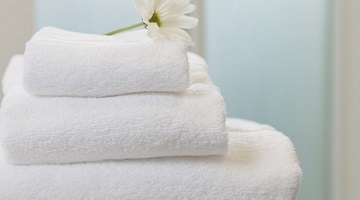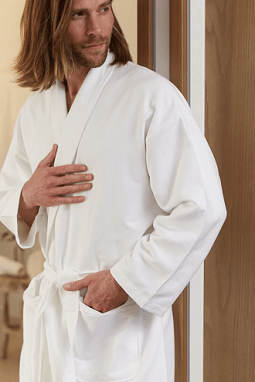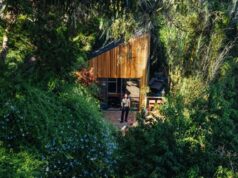NATIONAL REPORT—Advancements in textile technology are making it easier for hoteliers to incorporate towels and robes into a property’s sustainability program—product that requires less water and detergent to wash and less time to dry. The textile fiber type can vary but suppliers are currently offering material ranging from Extra Long Staple (ELS) cotton, to microfibers derived from plastic bottles, to TENCEL+Plus Lyocell derived from eucalyptus and other botanicals.

In just the last few months, Majestic International began selling earthright towels and robes made from ELS cotton. According to Wendy Thompson, President, Majestic International, towels come in bath mat, wash cloth, hand towel, bath towel, bath sheet and beach towel sizes.
The towels and robes require 10 to 20 percent less drying time, absorb 15x their weight, save 30 percent in water consumption, are 100 percent natural and biodegradable, and are Made in Green by OEKO-TEX. The Made in Green label verifies that an article has been tested for harmful substances.
According to Majestic, a 100 room property can reduce its greenhouse gas emissions by up to 38,900 pounds per year and achieve a water savings of up to 243,000 gallons by using ELS towels and robes.
“When you make [towels and robes] from a long staple cotton, it’s a softer fiber,” Thompson says. “It is more absorbent but not as heavy as other towels one typically would purchase.”
Thompson says the towels and robes made from ELS, if laundered properly, last as long as standard product. She highly recommends using biodegradable laundry detergent and not bleach.
Towels and robes sold by Majestic are made in India. “Our facilities are installed with state-of-the-art waste management systems and treatment plants to attain zero liquid discharge by processing the effluent wastewaters, and chemicals in all manufacturing units,” Thompson says. “We make the best use of renewable energy by harnessing the power of the sun and wind. We have the largest factory rooftop solar plant in India at 13.15 MW and installed wind energy of 6.21 MW of power.”
Green Earth Eco Towels
As part of its Eco Collection, Monarch Robe and Towel Co. offers Green Earth Eco towels made from ELS cottons. According to the company, the towels are 160 percent bulkier and more absorbent than traditional combed cotton towels. An independent test done at Destination Hotel’s Inverness Hotel proved they cost significantly less to launder, saving up to 30 percent in water consumption, using less detergent and taking 10 to 20 percent less drying time. Monarch Green Earth towels are manufactured in an agri-waste powered, zero discharge facility in India that produces no emission of effluents into the local water tables. The process also incorporates control union-certified, sustainable, eco-friendly dyes and chemicals to reduce impact on the environment.

Ashley Chadowitz, President of Monarch Robe and Towel, says his company’s Green Earth Eco ELS towels absorb as much water as a towel that is heavier. Because Green Earth Eco towels have better loadability, 30 percent more towels can be accommodated in every wash/dry cycle.
“You can use less detergent,” Chadowitz says. “We don’t recommend any bleaches.”
Chadowitz says that if a hotel transitions to Green Earth Eco towels, all the towels must be switched. “You can’t have two different towel types being laundered together,” he says.
Monarch Robe and Towel offers bath, hand, wash, bath sheet and oversized towels.
Whereas Majestic International’s robes are made from ELS, the robes that are part of the Monarch Robe and Towel Eco Collection are made from polyester microfibers that require one-third of the energy to wash and dry. These chamois robes are also available in a version made from certified recycled PET (rPET). Sixty-four robes save a cubic yard of landfill. rPet consumes 70 percent less energy to produce than regular polyester.
Valley Forge Fabrics’ Unique Towels
Valley Forge Fabrics offers towel sets made with TENCEL+Plus Lyocell derived from eucalyptus and other botanicals, blended with cotton. “Our towels absorb more moisture and dry faster than other fibers—plus, they get softer with every wash,” the company says.
Forty percent of the eucalyptus trees become the pulp used to create TENCEL+Plus Lyocell fibers. Twenty percent of the remaining tree is used in the production of vinegar and sweeteners. The remaining wood allows the fiber factory to be energy efficient as the wood is burned and converted to electricity. TENCEL+Plus Lyocell saves hundreds of gallons of water with each fiber production, when compared to other natural fibers, the company says. Since the eucalyptus trees grow in protected forests, not farms, no pesticides or irrigation is used. The only thing botanical trees need to survive is sunshine and rain.
“Manufacturing plants are all Oeko-Tex Certified and use the very best practices to ensure our cotton is grown without harm to anyone, while not restricting the farms that can grow it,” Valley Forge Fabrics says.
Glenn Hasek can be reached at greenlodgingnews@gmail.com.






